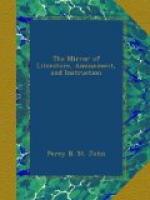“No,” continued I, seeing the impression my words had produced upon him, “I despise thee, and defy thee, even as Hercules did Antaeus, as Sampson did Harapha, as Orlando did Ferragus. ‘Bulk without spirit vast,’ I fear thee not; come on.” So saying, I rushed onward to the Mountain, who arose from his seat to receive me. The following passage from the Agonistes of Milton will give some idea of our encounter:
“As with the force of
winds and water pent,
When mountains tremble, these
two massy pillars,
With horrible convulsion to
and fro,
He tugged, he shook, till
down they came, and drew
The whole roof after them,
with burst of thunder,
Upon the heads of all who
sat beneath.”
“Psha!” said Julia, blushing modestly, “can’t you let me go?” Sweet Julia, I had got her in my arms.
“But where,” said I, “is Mr. Tims?”
“Mr. who?” said she.
“The Man-Mountain.”
“Mr. Tims!—Man-Mountain!” resumed Julia, with unfeigned surprise. “I know of no such persons. How jocular you are to-night—not to say how ill-bred, for you have been asleep for the last five minutes!”
“Sweet, sweet Julia!”
A MODERN PYTHAGOREAN.
Blackwood’s Magazine.
* * * * *
SONG.
BY T. CAMPBELL.
’Tis now the hour—’tis
now the hour
To bow at Beauty’s
shrine;
Now whilst, our hearts confess
the power
Of woman, wit,
and wine;
And beaming eyes look on so
bright,
Wit springs—wine
sparkles in their light.
In such an hour—in
such an hour,
In such an hour
as this,
While Pleasure’s fount
throws up a shower
Of social sprinkling
bliss,
Why does my bosom heave the
sigh
That mars delight?—She
is not by!
There was an hour—there
was an hour
When I indulged
the spell
That Love wound round me with
a power
Words vainly try
to tell—
Though Love has fill’d
my checker’d doom
With fruits and thorns, and
light and gloom—
Yet there’s an hour—there’s
still an hour
Whose coming sunshine
may
Clear from the clouds that
hang and lower
My fortune’s
future day;
That hour of hours beloved
will be,
That hour that gives thee
back to me!
New Monthly Magazine.
* * * * *
THE GATHERER.
“A snapper-up of unconsidered
tifles.”
SHAKSPEARE.
* * * * *




